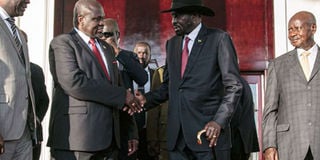South Sudan donors urge leaders to speed up deal

South Sudan's President Salva Kiir (2nd R) and opposition leader Riek Machar (2nd L) shake hands after talks in Entebbe, on November 7, 2019 on the proposed unity government. PHOTO | MICHAEL O'HAGAN | AFP
What you need to know:
- The pending tasks include cantonment of troops, training and unification of 83,000 soldiers from various factions into one professional national army ahead of the transitional period.
Juba. South Sudan’s main coalition of donors are calling on key protagonists in the conflict to urgently implement remaining tasks of the peace deal before the pre-transitional deadline expires.
On Saturday, the United States, Norway and the United Kingdom - the main countries that have funded peace negotiations in South Sudan - say the country is running out of time to finalise the transitional government.
Known as the TROIKA, the three called on key principals to the signed peace agreement (R-ARCSS) to commit themselves to finalising pending tasks before lapse of the remaining 48 days of an extended deadline for the unity government.
The pending tasks include cantonment of troops, training and unification of 83,000 soldiers from various factions into one professional national army ahead of the transitional period.
On the other hand, the parties haven’t agreed on the number and boundaries of states which seems to be an obstruction to formation of a coalition government.
Several meetings meditated by IGAD, the regional bloc that has midwifed the conflict, between the government and SPLM-IO regarding the number and boundaries of states have always ended in vain due to varying interests.
In a TROIKA statement, the coalition called on the leaders to utilise the remaining 48 days efficiently so that the unity government can be formed on time.
“With less than six weeks remaining to meet the extended deadline to form a Transitional Government of National Unity, South Sudan’s leaders have a clear duty to their citizens to deliver.
“We commend the leadership of the Intergovernmental Authority on Development in its continued efforts to mediate among the parties, and we commit to work with the region to ensure that the parties deliver progress” reads the statement.”
The group also welcomed recent meetings between the key principals, President Salva Kiir and former vice President Riek Machar who leads opposition SPLM-IO faction; and their public commitment to form a government of national unity by the February deadline.
“We urge all sides to build on this, to continue dialogue, and to ensure meaningful progress. We call on all sides to further demonstrate that they possess the political will to deliver peace. We also remind all parties to uphold, and affirm publicly, their commitment to the permanent ceasefire, and to instruct their forces to exercise restraint,” said the statement.
Kiir and Machar signed a revitalised agreement in September 2018 and had an initial deadline of six months to form a transitional government that would last for three years before an election is held.
The agreement, known as ‘revitalsed’ because it included other factions to the conflict, has however been difficult to implement, forcing the parties to postpone formation of the transitional government twice.
In November, Kiir and Machar agreed in Kampala to extend the deadline by 100 days so the three key issues are sorted.
Observers are worried that more than half of that time has elapsed without tangible solutions.
On Saturday, the TROIKA called on ending reliance on military force and creating political space for a diverse range of voices from all political parties, civil society, and the media.
“Media is essential to creating a durable peace and an inclusive government that represents the interests of all parties to the agreement”.
They further urged the signatories to the revitalised peace agreement to fulfill their obligations to represent the interests of all South Sudanese.
On December 31, the Joint Military Ceasefire Commission transported government and opposition forces to a training centre in Masana Beera, Wau State. This a major development in the implementation of the security arrangements, one of the outstanding issues.





